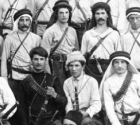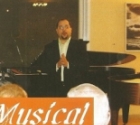
Rembrandt's depiction of the biblical account of Belshazaar seeing the writing on the wall. (Wikipedia)
These mysterious words were written upon the wall of King Belshazzar's banqueting hall whilst he was hosting a great pagan feast for his lords to worship their heathen idols. At that time the Jews were captives in Babylon following the fall of Jerusalem to Nebuchadnezzar, Belshazzar's father in 597 BC. Their sacred golden vessels had been taken from Solomon's Temple and were now filled with wine for the drunken guests who were reveling in the miserable plight of their captives. Suddenly the disembodied fingers of a human hand appeared upon the wall and wrote the mysterious words 'Mene, mene, tekel, upharsin.' The terrified Belshazzar called for his astrologers and magicians to decipher the inscription, but they were unable to read it. Daniel, an exiled Jew from Jerusalem and now an advisor to the king was then summoned to the palace and promised many rich rewards if he could interpret the message, Daniel rejected all offers of reward for his services. He revealed that God had numbered the days of the kingdom of Belshazzar and brought it to an end, that the King had been weighed in the balance and had been found wanting and that his kingdom would be divided among the Medes and Persians (Daniel v1-28) That night King Belshazzar was slain and Cyrus the Mede became King. Cyrus subsequently released the Jews from captivity and they returned to Jerusalem to rebuild their Temple.
Handel wrote an oratorio, 'Belshazzar', based on the biblical account of the fall of Babylon. It was first performed in March 1745 in the King's Theater, London, and was well received at the time but has subsequently been neglected. However, a couple of the verses written by Charles Jennens deserve a mention.
Belshazzar: '………………..Bring those vessels,
Those costly vessels my victorious grandsire
Took from the Temple of Jerusalem.
And in the temple of Bel laid up,
But us'd them not;-'tis fit they should be us'd.
And let their God, whose pow'r was found too weak
To save his people, serve the conqueror
Of him and them. We'll revel in his cups:
Their rich materials and choice workmanship
Shall well augment the splendor of our feast.
And as we drink, we'll praise our country gods.
To whom we owe the prize.'
******************
Daniel: '…………..I'll read this oracle, and thou,
But to thy cost, shalt understand.
Thou, O king,
Hast lifted up thyself against the Lord of Heav'n.
Whose vessels they have brought before thee.
And thou, thy lords, thy wives, and concubines,
Have drunk wine in them! Thou hast prais'd the gods
Of gold and silver. Brass, iron, wood and stone,
Which neither see, nor hear, nor ought perceive!
But Him, the God whose hand holds thy life,
And in whose high dispose are all thy ways,
Thou hast not glorified, but hast blasphem'd.
From Him the hand was sent, by his appointment
These words were written;
MENE, MENE, TEKEL, UPHARSIN. Which I must interpret.
MENE: the God whom thou hast dishonour'd.
The days hath number'd of thy reign, and finish'd it.
TEKEL: thou in the balances are weigh'd,
And are found wanting.
PERES: thy kingdom is divided,
And to the Medes and Persians given.
Over the years this story became the basis for several artistic interpretations. One well known verse comes from Edward Fitzgerald's 1859 translation of the Rubaiyat of Omar Khayyam written in the 12th century.
'The Moving Finger writes; and, having writ,
Moves on; nor all your Piety nor Wit
Shall lure it back to cancel half a Line,
Nor all your Tears wash out a Word of it'
Today the saying 'to read the writing on the wall' implies an ability to foretell inevitable doom.
In 1635 Rembrandt painted a magnificent work called 'Belshazzar's Feast'. It depicts the moment when Belshazzar at the banquet notices the hand writing on the wall. He is dressed in his fine robes and turban of gold whilst fear and horror are reflected in his face. The feast table shows the splendid golden goblets and vessels which were taken from the Temple in Jerusalem. The huge painting (oil on canvas, 167.6 × 209.2 cm) which hangs in the National Gallery, London is a superb example of baroque large scale history paintings. It is thought that Rembrandt, who lived in Amsterdam among a large Jewish population, consulted the learned Rabbi and printer, Manasseh ben Israel about the Hebrew lettering which in this painting, runs from right to left vertically.
Some years later in 1929 William Walton received the first commission ever to be offered by the BBC to a British composer for a work scored for a small chorus and soloist. He chose the biblical fall of Belshazzar and asked his friend Osbert Sitwell to write the libretto. The final work grew to a grand scale including large orchestra, two brass bands and a multitude of percussions. It also included a large variety of choral writings and fugues, so that it couldn't be considered suitable for broadcasting. It was a magnificent oratorio lasting 37 minutes which the famous conductor Sir Henry Wood described as 'truly marvelous, like the world coming to an end'. It was music on an impressive scale; the orchestration was absolutely brilliant and evocative. In 1947 Herbert von Karajan called it the best choral music to have been written in the past fifty years. It was heard as far afield as Sydney, Brussels, Vienna and Boston and was an outstanding success. It includes a wonderfully expressive aria: 'If I forget thee, O Jerusalem……..' and a choral 'By the waters of Babylon there we sat down and wept………'
'Belshazzar's Feast' was a massive choral cantata, the chorus representing the Jewish people throughout. It was not at first accepted by the Church of England as a work suitable for performance in cathedrals and was banned from the Three Choirs Festival' for a quarter of a century until 1957. (The Three Choirs Festival is a music festival which is held each August alternately at the cathedrals of the Three Counties, Hereford, Gloucester and Worcester and originally featured their three choirs), The 'Times' critic had indicated that he was in favor of the ban as although it was a 'work of intense energy and complete sincerity' he decreed the work 'stark Judaism from first to last' adding, 'it culminates in ecstatic gloating over the fallen enemy, the utter negation of Christianity………no more a sacred oratorio than is Handel's on the same subject.'
A performance of 'Belshazzar's Feast' is spectacular beginning with 'Thus spake Isaiah….' and continuing through to 'In Babylon Belshazzar the king made a great feast'………then come the words;-
“And in that same hour, as they feasted came forth fingers of a man's hand and the King saw the part of the hand that wrote…………..And this was the writing that was written:
'Mene, Mene, Tekel Upharsin' 'Thou art weighed in the balance and found wanting'.
In that night was Belshazzar the King slain and his Kingdom divided”
to the final 'Then sing aloud to God our strength'. The Jews’ eventual victory is sung in praise and thanksgiving with the words 'Alleluia, for great Babylon's fallen' mixed with regret 'While the kings of the earth weep and wail' for the fallen city. 'Belshazzar's Feast' with its barbaric splendour and amazing energy is still able to overwhelm its audience and remains an important cantata for many choral societies.
 DEAR EDITOR 153
DEAR EDITOR 153 REVISITING THE PAST BETH HASHOMER
REVISITING THE PAST BETH HASHOMER BIBLICAL ZOOS & ANIMAL RESERVES IN ISRAEL
BIBLICAL ZOOS & ANIMAL RESERVES IN ISRAEL Art from the Heart
Art from the Heart Jewish Art Returns to Jerusalem
Jewish Art Returns to Jerusalem Musical Treats
Musical Treats Barbara Blum
Barbara Blum